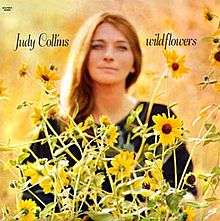Wildflowers (Judy Collins album)
Wildflowers is the seventh studio album by Judy Collins, released in 1967. It is her highest charting album to date, reaching No. 5 on the Billboard Pop Albums charts.[2] It included her Top 10 hit version of Joni Mitchell's "Both Sides, Now".[3]
| Wildflowers | ||||
|---|---|---|---|---|
 | ||||
| Studio album by | ||||
| Released | October 1967 | |||
| Recorded | New York City, 1967 | |||
| Genre | Folk | |||
| Length | 35:44 | |||
| Label | Elektra | |||
| Producer | Mark Abramson | |||
| Judy Collins chronology | ||||
| ||||
| Singles from Wildflowers | ||||
| ||||
| Review scores | |
|---|---|
| Source | Rating |
| Rolling Stone | (favorable) [1] |
| AllMusic | |
The album was arranged by Joshua Rifkin and produced by Mark Abramson. Collins' recording "Albatross" was used in the 1968 film adaptation of The Subject Was Roses. It was one of three self-penned tracks that appeared on the album, the first time that Collins wrote her own material.[4]
Wildflowers was certified Gold by the RIAA in 1969, for sales of over 500,000 copies in the US.[5]
Track listing
Side one
- "Michael from Mountains" (Joni Mitchell) – 3:10
- "Since You Asked" (Judy Collins) – 2:34
- "Sisters of Mercy" (Leonard Cohen) – 2:31
- "Priests" (Leonard Cohen) – 4:55
- "A Ballata of Francesco Landini" (ca. 1335 - 1397) Lasso! di Donna – 4:34
Side two
- "Both Sides Now" (Joni Mitchell) – 3:14
- "La chanson des vieux amants (The Song of Old Lovers)" (Jacques Brel) – 4:40
- "Sky Fell" (Judy Collins) – 1:47
- "Albatross" (Judy Collins) – 4:51
- "Hey, That's No Way to Say Goodbye" (Leonard Cohen) – 3:28
Personnel
- Judy Collins – vocals, guitar, keyboards
- Joshua Rifkin – arranger, conductor ("Priests" arranged by Robert Sylvester and Robert Dennis[6])
- Other musicians uncredited
Production
- Mark Abramson - producer
- John Haeny - engineer
- Jim Frawley - photography
- William S. Harvey - art direction and design
- Guy Webster - cover photography
gollark: <@550187576049270798> Desktop Linux is usable. Linux distros are generally way more customizable, run better without £1000 hardware, actually have package managers, and don't have all the Apple app store stuff going on.
gollark: Also odd CPU choice.
gollark: Odd hostname.
gollark: ~~btw I use arch~~
gollark: I mean, I don't actually know what task manager equivalents are available for that because I just check via htop or netdata mostly.
References
- Christman, James (10 February 1968). "Records". Rolling Stone (5).
- "Judy Collins - Awards - AllMusic".
- "Judy Collins - Chart history - Billboard".
- ""Albatross"". Songfacts.com. Retrieved 2010-03-29.
- "American album certifications – Judy Collins". Recording Industry Association of America. If necessary, click Advanced, then click Format, then select Album, then click SEARCH.
- June 30, 2013 Joshua Rifkin interview with David Garland WNYC
This article is issued from Wikipedia. The text is licensed under Creative Commons - Attribution - Sharealike. Additional terms may apply for the media files.